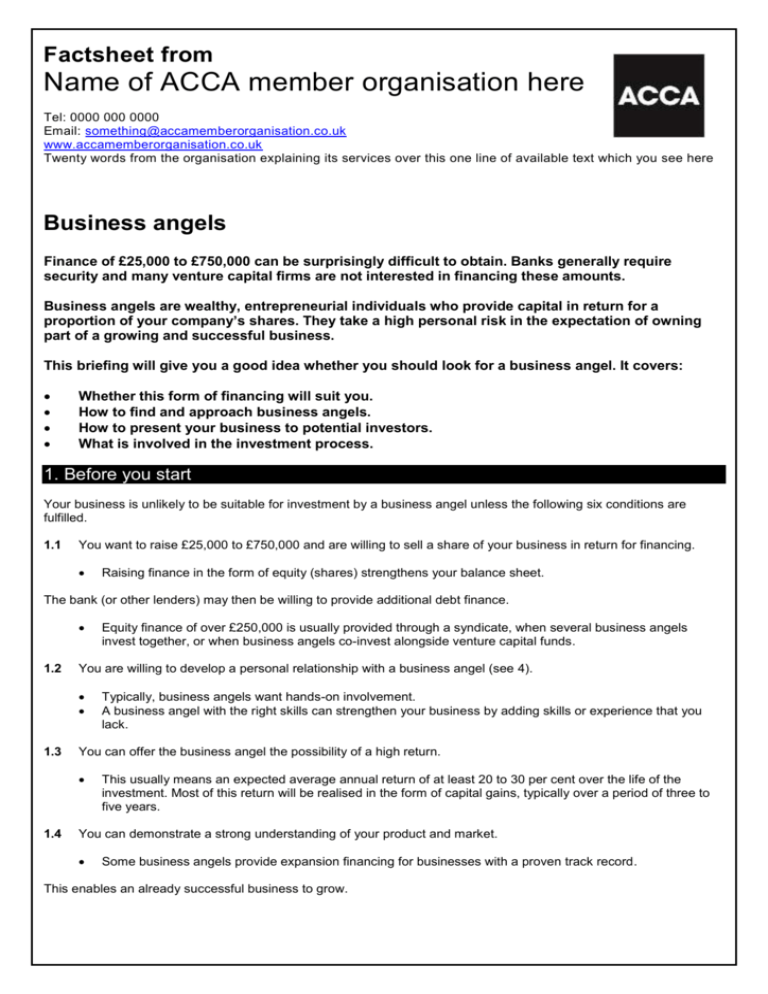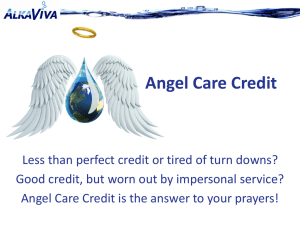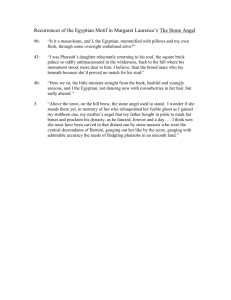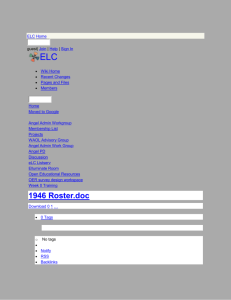
Factsheet from
Name of ACCA member organisation here
Tel: 0000 000 0000
Email: something@accamemberorganisation.co.uk
www.accamemberorganisation.co.uk
Twenty words from the organisation explaining its services over this one line of available text which you see here
Business angels
Finance of £25,000 to £750,000 can be surprisingly difficult to obtain. Banks generally require
security and many venture capital firms are not interested in financing these amounts.
Business angels are wealthy, entrepreneurial individuals who provide capital in return for a
proportion of your company’s shares. They take a high personal risk in the expectation of owning
part of a growing and successful business.
This briefing will give you a good idea whether you should look for a business angel. It covers:
Whether this form of financing will suit you.
How to find and approach business angels.
How to present your business to potential investors.
What is involved in the investment process.
1. Before you start
Your business is unlikely to be suitable for investment by a business angel unless the following six conditions are
fulfilled.
1.1
You want to raise £25,000 to £750,000 and are willing to sell a share of your business in return for financing.
Raising finance in the form of equity (shares) strengthens your balance sheet.
The bank (or other lenders) may then be willing to provide additional debt finance.
1.2
You are willing to develop a personal relationship with a business angel (see 4).
1.3
Typically, business angels want hands-on involvement.
A business angel with the right skills can strengthen your business by adding skills or experience that you
lack.
You can offer the business angel the possibility of a high return.
1.4
Equity finance of over £250,000 is usually provided through a syndicate, when several business angels
invest together, or when business angels co-invest alongside venture capital funds.
This usually means an expected average annual return of at least 20 to 30 per cent over the life of the
investment. Most of this return will be realised in the form of capital gains, typically over a period of three to
five years.
You can demonstrate a strong understanding of your product and market.
Some business angels provide expansion financing for businesses with a proven track record.
This enables an already successful business to grow.
Business angels are also a significant source of start-up and early-stage capital for companies without a
track record.
A business plan based on thorough market research is essential.
1.5
You have an experienced and professional management team.
As a minimum, you must have strong product and sales skills.
You need to show enthusiasm and commitment.
A measure of your commitment will be how much money you (and other managers) have invested in the business and
how strongly your personal earnings are linked to the success of the business.
1.6
You can offer the business angel the option of an exit.
Even if the business angel has no plans to realise the investment by any particular date, the angel will want the option
to be available. The most common exits are:
A trade sale of the business to another company.
Repurchase of the business angel’s shares by the company at current market value.
Purchase of the business angel’s shares by the company’s directors or another investor at current market
value.
2. Finding an angel
2.1
Many contacts are made informally. For example:
2.2
Personal friends and family.
Wealthy business contacts.
Individuals known to your professional advisers (eg your accountant).
Major suppliers and clients of your business.
You may want to approach an angel networking organisation (see box).
Many of the most active business angels use these services to find out about interesting investment opportunities.
You usually have to supply a credible business plan and financial forecasts as part of the registration
process.
Once you are registered, the organisation passes information on to business angels.
Typically, angels will attend presentation meetings (where you present your business to them) or receive
bulletins.
2.3
The business-to-business sections of various newspapers include advertisements from investors and from
businesses looking for finance.
If you want to advertise your business, the advertisement will have to meet the newspaper’s standards.
3. The pitch
You usually do not get much time or space in which to present your business to potential investors. Prepare a
convincing, concise pitch.
3.1
Explain your business to prove that you understand what you are doing.
Explain what your business does.
Avoid incomprehensible jargon.
2
Explain what the key factors to the success of your business are.
For example, product excellence or uniqueness, focusing on a specific market niche, or superior customer service.
Explain how you intend to use the money you raise.
For example, to buy new equipment.
Remember, your pitch should be tailored to raising money.
Business angels will be far more interested if you can demonstrate that you have firm, profitable orders from blue chip
companies, and have invested your own money in the business.
3.2
Demonstrate that you are offering a potentially profitable opportunity.
Highlight your key financial projections.
Stress the progress you have made so far.
For example, show your previous sales and profits growth, and include references from committed customers.
Mention any endorsements you have.
For example, an order from a ‘blue chip’ customer or a good review in a newspaper.
3.3
Indicate how much money you want to raise and what percentage of your business you are willing to sell in
return – remain flexible.
3.4
Be prepared with the details.
You should have prepared a full business plan even if you are not making it available to potential investors at this
stage.
You need to be able to justify what you have said and written.
At a presentation, you should be prepared to answer most questions immediately.
4. A personal deal
Investments by business angels are comparatively informal and rely on a greater degree of personal chemistry and
trust than other forms of financing. But you will still need to negotiate the legal aspects.
4.1
Look for a business angel whose priorities match your needs.
If you only want investment, look for an angel who is happy to be a passive investor.
If you need help, look for an angel with the time and skills that you need.
For example, management experience, technical expertise, or contacts.
4.2
Decide whether the business angel is someone you could work with by trying to get answers to the following
questions:
What motivates the business angel? What is the angel looking for?
What skills does the angel have to offer?
What appeals most about your business?
What causes the most concern?
What key weaknesses does the angel identify?
Which aspects of the business does the angel find exciting?
Your aim is to develop a personal relationship.
3
4.3
Check the business angel's credentials [NB this is present on the pdf, but not on the Word doc]
This is particularly important if the angel is using the investment to buy a job.
Ask for a copy of the angel’s CV.
Look for evidence of previous success.
Confirm the angel’s track record by contacting previous employers and companies the angel has invested in.
Telephone or visit them. (If you ask for this information in writing, you are likely to get a guarded response.)
Try out the business angel.
You can get a better idea of an angel’s skills by asking what the angel would do about a particular problem.
5. The investment process
5.1
Once a business angel has expressed an interest, officially confirm that the angel can provide the financing.
5.2
Even though you may not have agreed final investment terms, you do not want to waste your time with
someone who has insufficient funds.
If you are still going to need additional financing, you will need to start arranging it immediately.
Negotiate key issues and what-if scenarios.
Give the angel a copy of your business plan as a basis for discussing key points such as:
The investment — how much the business angel invests, the form of the investment, and what the angel
gets for the investment.
Withdrawing money — what dividends, fees and salaries will be paid to each of you.
Under what circumstances can these be changed?
Responsibilities — who makes which decisions and who will be responsible for each area of the business.
How will individual performance be monitored and what will be done if performance is not satisfactory?
Growth — what your main objectives are and how you will achieve the next stage of growth.
What will happen if the business needs more capital?
5.3
Exit — how and when the business angel will be able to realise the investment. Who will the angel be
allowed to sell shares to?
Provide the business angel with any information required.
The business angel will want to check financial and legal details, and confirm other points about your business and the
market.
5.4
Your accountant will be able to help prepare any financial information you need (eg annual accounts).
For larger investments, the business angel may use professional advisers to investigate your business.
Negotiate any legalities the business angel is concerned about. The business angel may ask you to provide:
Warranties confirming that information you have provided is true.
4
If the business later fails and it can be proved that you gave misleading information, the investor will usually have the
right to claim compensation from whoever provided the warranty (typically you).
Indemnities, where you agree to accept liability in certain circumstances.
For example, if the company is sued in relation to contracts which have already been completed.
If asked for either of these, get advice from your solicitor.
5.5
Agree the final investment terms.
Your accountant and solicitor will be able to advise you on what form the investment should take and help
you negotiate investment terms.
It may be possible to structure the investment to make it more tax efficient for the investor.
Make sure everything is in writing, including all the key issues.
The larger the investment, the more complicated and time consuming the investment process is likely to be. For larger
investments you may want to use specialist advisers who are experienced with this kind of deal.
The British Business Angels Association
The British Business Angels Association (BBAA) is the trade association for the business angel industry. All of BBAA’s
members have signed up to a code of conduct guaranteeing standards.
Their website, www.bbaa.org.uk, makes it relatively easy to pick out a business angel introduction agency that meets
your needs.
Their business angel network directory lists contact details, organisation details, geographical territory, registration
criteria, investment preferences and methods of matching.
The BBAA website also gives comprehensive details on business angel investment in general.
A hard copy of all of the information on the website is also available from BBAA. To obtain a copy, call 020 7089 2305
or email katie@bbaa.org.uk.
Expert contributors
Thanks to Patrick Frederick (Aimex International, 020 7754 5525 / 07963 614072); David Sullivan (London
Development Agency, 020 7593 8072).
Further Help
Last reviewed 01.08.11
© BHP Information Solutions 2011. ISSN 1369-1996. All rights reserved. No part of this publication may be reproduced or transmitted without the
written permission of the publisher. This publication is for general guidance only. The publisher, expert contributors and distributor disclaim all liability
for any errors or omissions. Consult your local business support organisation or your professional adviser for help and advice.
5








